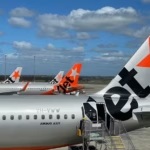Emirates has reaffirmed its commitment to sustainability by showcasing its environmentally-kind initiatives.
Only One Earth
The UAE flag carrier’s environmental strategy focuses on three key areas – reducing emissions, consuming responsibly, and preserving wildlife and habitats.
The carrier has focused significantly on improving its inflight products and service development in line with more environmentally-conscience replacements – with help from an in-house team of sustainability experts.
Plastic straws and stirrers were replaced with responsibly sourced paper and wooden alternatives.
New sustainable blankets in Economy Class are made from 28 recycled plastic bottles each and, thanks to how cosy it is, it is also a customer favourite.
Thanks to these two replacements alone, Emirates will save 150 million single-use plastic items from landfill.
New Economy Class amenity kits were introduced this year after extensive sustainability reviews. The reusable kits are made from washable kraft paper and contain durable travel essentials made from environmentally friendly materials. The toothbrush is made from a combination of wheat straw and plastic, and the packaging used for the dental kit, socks and eyeshades is made from 90% rice paper. The socks and eyeshades themselves are made from rPET (recycled polyethylene terephthalate).
Adults aren’t the only customers able to experience environmentally-kind products on board. Emirates’ complimentary toy bags, baby amenity kits, and plush toys are all made from recycled plastic bottles. Even the small details have been upgraded – non-toxic soy-based inks were used for the print on the tags, and the tags themselves are made with recycled cardboard.
Moving on to the food and drink on board, Emirates has claimed that it looks at all products in flight with the intent to reduce resource consumption whenever possible. The Dubai-based carrier works with a wide range of suppliers and sources locally or regionally where feasible to minimise the environmental impact of its supply chain. Suppliers are also evaluated against the airline’s standards of sustainable sourcing, ensuring all products the carrier invests in are legitimately what it says on the tin.
Paper menus in Economy Class were replaced in April 2020 with digital menus, which saves 44 tonnes of paper per month and supports Emirates’ efforts to remove all excess weight to save on fuel.
Glass and plastic are sorted on board before being sent to a recycling part in Dubai as the carrier utilises every opportunity to upcycle and recycle.
In regards to aircraft operations, Emirates has committed to cutting fuel consumption and utilising its partnerships with air navigation service providers to save fuel and time.
Emirates is also investing in solar power systems to generate ‘clean’ electricity at its major facilities in Dubai (including its Engine Maintenance Centre). In doing so, the major UAE carrier will save over 4 million kilograms of carbon dioxide emissions annually.

Interestingly, from next week, the carrier will trial an electric bus for six months to ferry passengers from remote stations. These buses will be entirely carbon-free and will operate on an intelligent energy system.
Rounding up the extensive sustainability-focused highlights reel is the carrier’s commitment to supporting biodiversity and conversation.
According to Emirates, the airline has helped to support a sustainable and balanced ecosystem at The Dubai Desert Conservation Reserve (a 225-square-kilometre natural reserve established in January 2002) for over 20 years. The reserve represents almost 5% of Dubai’s total land area and protects the vast amount of wildlife and vegetation within the United Arab Emirates’ vibrant and unique ecosystem.
That just about does it. Emirates has undergone a decent amount of change in light of aviation’s mission to improve its huge impact on our environment.
Competitor and fellow UAE flag carrier Etihad Airways completed the world’s most intensive sustainable flight-testing programme this May using the Airbus A350 (or Sustainable50).
Elsewhere, Mexican aerospace manufacturer Embraer has pledged to use 100% renewable energy at its Brazil base from 2024.
Happy World Environment Day! Let us know what you think of Emirates’ initiatives in the comments below. Maybe you’ve had the pleasure of experiencing them first-hand?









